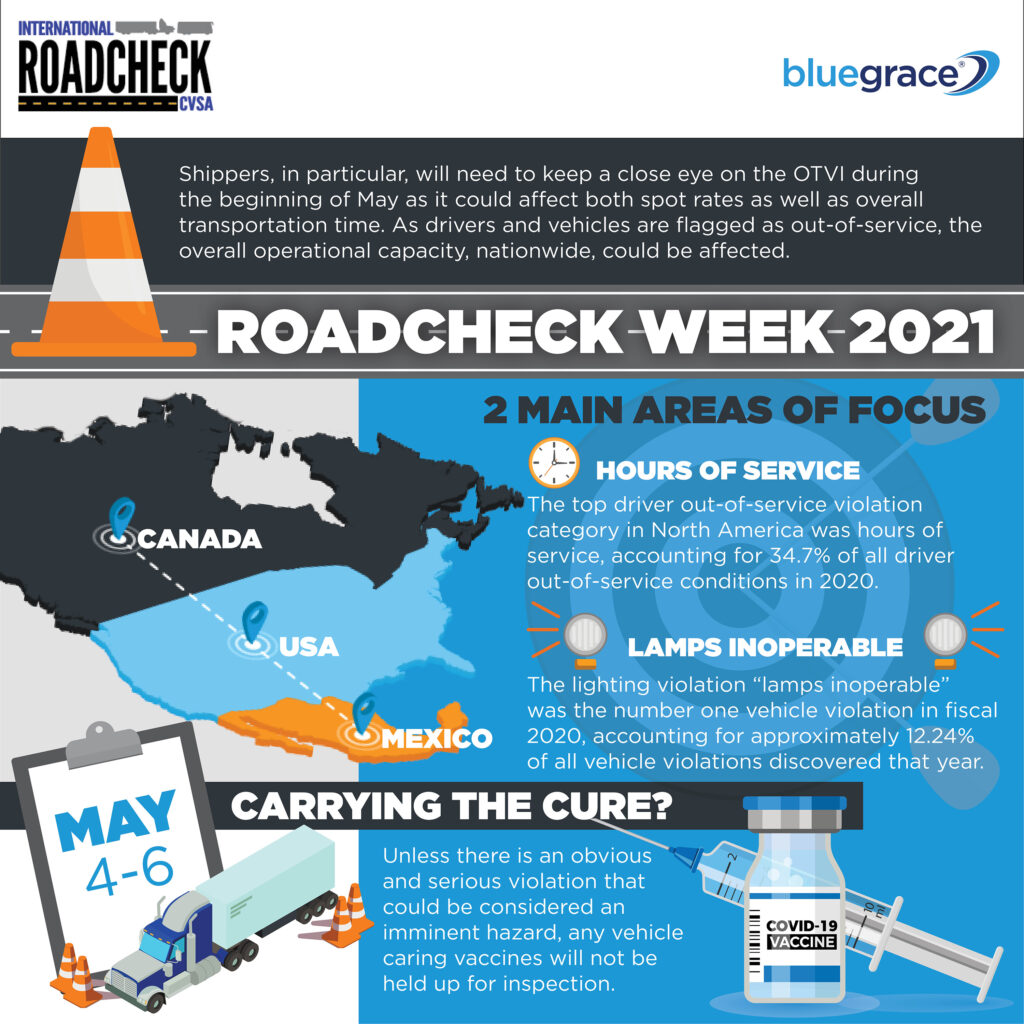
Roadcheck week is a program created by the Commercial Vehicle Safety Alliance (CVSA) which will deploy inspectors across the country to ensure that commercial vehicles and their drivers are upholding the set safety standards. Every year, the CVSA chooses a focus for their inspections, typically based on the past year’s violations. Last year, in 2020, it was driver violations. This year, they will be focusing on the top vehicle maintenance issues and driver violations from 2020 which were vehicle lighting and hours-of-service compliance.
CVSA President Sgt. John Samis, who is also with the Delaware State Police, said in a CVSA statement that there is an element of business as usual during Roadcheck Week. “The inspections conducted during the three days of International Roadcheck are no different from the inspections conducted any other day of the year,” he said. “Other than data collection, the inspection process is the same.
Shippers will need to take Roadcheck week into account when planning their freight movement.
While Roadcheck week is an important safety measure to ensure unfit vehicles and drivers aren’t in operation (and a risk to the public) it does pose a serious issue in terms of how it affects the available capacity and market spot rates. Shippers will need to take Roadcheck week into account when planning their freight movement.
2021 Inspection Criteria
Inoperable lamps were the top vehicle violation in 2020, accounting for 12.24 percent of all vehicle inspection failures discovered for the entire year, according to the Federal Motor Carrier Safety Administration.
Inspectors will also be checking the vehicle’s brake systems, cargo securement, coupling devices, driveline/driveshaft components, driver’s seat, exhaust systems, frames, fuel systems, lighting devices, steering mechanisms, suspensions, tires, van and open-top trailer bodies, wheels, rims, hubs and windshield wipers to ensure all meet the necessary specifications.
For drivers, hours-of-service violations reached nearly 34.7 percent of all driver-related concerns. During the inspection, inspectors will check the driver’s operating credentials, hours-of-service documentation, seat belt usage and for alcohol and/or drug impairment. A driver will be placed out of service if an inspector discovers driver-related out-of-service conditions.
Any vehicle found with a “critical vehicle inspection item violation” will be considered out-of-service, meaning the vehicle cannot be operated until the condition has been corrected and re-inspected.
In light of the importance of COVID-19 vaccine transportation, any vehicle caring vaccines will not be held up for inspection, unless there is an obvious and serious violation that could be considered an imminent hazard.
Successfully passing the inspection will earn the vehicle and driver a CVSA decal. During the three-month period that the decal is valid, both driver and vehicle will not be subjected to subsequent inspections. In light of the importance of COVID-19 vaccine transportation, any vehicle caring vaccines will not be held up for inspection, unless there is an obvious and serious violation that could be considered an imminent hazard.
“CVSA shares the dates of International Roadcheck in advance to remind motor carriers and drivers of the importance of proactive vehicle maintenance and driver readiness,” Samis said. “International Roadcheck also aims to raise awareness of the North American Standard Inspection Program and the essential highway safety rules and regulations in place to keep our roadways safe.”
Roadcheck Week Causes Volume Drop and Capacity Fluctuation
While the program is designed to keep both truck drivers and other motorists safe, it also comes with an unintended consequence. During Roadcheck week, the Outbound Tender Volume Index (OTVI) drops precipitously, causing a shortage in both transportation volume as well as fluctuations in available capacity.
In 2020, during the inspection blitz, OTVI fell from over 16,125 down to 13,628. The only other times during the course of the year it has been lower was over the Thanksgiving and Christmas holidays.
Typically speaking as OTVI climbs, capacity gets tighter as it suggests that more loads are being tendered on a daily basis. That being said, a drop in OTVI would suggest more available capacity, but that may not be the case. As drivers and vehicles are flagged as out-of-service, the overall operational capacity, nationwide, could be affected. Given the immediate needs of the COVID-19 vaccine rollout, capacity is already stretched thin, especially for dry van and reefer units given the storage requirements of the vaccines.
Many drivers prefer to avoid Roadcheck week altogether and opt to take vacation during this time which causes a temporary disruption in capacity and thins out the already shallow pool of available drivers.
Additionally, many drivers prefer to avoid Roadcheck week altogether and opt to take vacation during this time which causes a temporary disruption in capacity and thins out the already shallow pool of available drivers. With fewer available drivers and more shippers turning to the spot market to find available capacity, rates could increase
Shippers, in particular, will need to keep a close eye on the OTVI during the beginning of May as it could affect both spot rates as well as overall transportation time. It is important that shippers begin considering their options now as Roadcheck week will soon be upon us.



